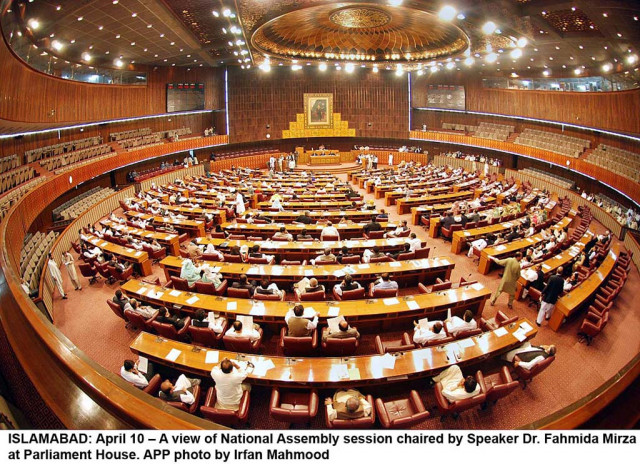Govt gets two bills approved from NA
Opposition continues boycott over FATA bill withdrawal

National Assembly.
PHOTO: APP/FILE
The assembly transacted most of the day’s regular agenda after lack of quorum had led to adjournment of proceedings in previous sittings. However, withdrawal of the Fata reform bill from the agenda remained in focus as the opposition continued its boycott.
Quorum was twice pointed out by an independent lawmaker after walkout by the opposition but the treasury benches managed to meet the required number to run the House.
Leader of Opposition Syed Khursheed Shah said on a point of order before the walkout that the government wanted to sidestep the issue of reforms in Fata and the region’s merger with Khyber-Pakhtunkhwa.
He said the government itself made the Fata reform bill part of the agenda for December 11 and then withdrew it before it could be debated, without consulting anyone.
Dropping FATA bill: Opposition continues boycott of NA proceedings
He said the people of Fata wanted to come under the ambit of all the articles of the Constitution. He said the government should follow the Constitution rather that any law or agreement of the British era. According to Shah, 95% of people in Fata want merger with K-P and the legal and constitutional right to have access to the Peshawar High Court and Supreme Court of Pakistan.
He vowed not to let Parliament become a rubber stamp and said the opposition boycott would continue till the Fata reform bill was included in the agenda.
Pakhtunkhwa Milli Awami Party chief Mahmood Khan Achakzai, a coalition partner, said the merger would create problems for the country. He said under Article 311 of the Act of 1935 the people of Fata were free persons and there was no mention of Fata in the Act of 1947.
“The matter of Fata is sensitive. Afghanistan will raise objections to it,” he said.
Achakzai, whose party along with another government ally Jamiat Ulema-e-Islam-Fazl has been opposing Fata’s merger with K-P, said the Frontier Crimes Regulation (FCR) in the tribal areas should be abolished first. He called for the formation of a committee comprising representatives of all stakeholders to debate the matter and demanded a separate governor for Fata.
Minister for States and Frontier Regions (Safron) Abdul Qadir Baloch said the government was committed to introducing the bill in the assembly. He said the bill had been withheld because of technical reasons but would hopefully be tabled in a couple of days, after the prime minister’s meeting with parliamentary party leaders scheduled for Friday.
Govt seeks to woo opposition on FATA, delimitation bills
As Qaumi Watan Party chief Aftab Sherpao was speaking later, PTI lawmaker Ali Muhammad interrupted him and said those willing to talk about Kabul should go there. “Fata is part of Pakistan and will continue to be so. Don’t humiliate the people of Fata,” the emotionally charged MNA said.
Deputy Speaker Murtaza Javed Abbasi, who was chairing the session, asked him to maintain the decorum of the House.
Sherpao asked the government to own the bill and called for making Fata part of K-P and giving resources to it. He said the government should declare what it wanted and hold negotiations.
The entire opposition staged a walkout from the House. However, MQM legislators and one each from the PTI and the PPP returned after a short time.
The House passed the Women in Distress and Detention Fund (Amendment) Bill, 2017 tabled by Human Rights Minister Mumtaz Ahmed Tarar and the Rulers of Acceding States (Abolition of Privy Purses and Privileges) (Amendment) Bill tabled by the Safron minister.
It also took up two calling-attention notices about increase in the prices of fertilisers and petroleum products.
National Food Security and Research Minister Sikandar Hayat Bosan assured the House that no proposal was under consideration to reduce import duty on maize. He said the government would not take any step to harm the interests of the growers of maize and sugarcane.
He said the demand for urea fertiliser was 3.075 million tonnes while a stock of 3.465m tonnes was available. He said a proposal to withdraw all taxes on the fertiliser sector was under consideration.
Minister of State for Petroleum Jam Kamal said that petrol prices depended on the international market. He said the government always passed on maximum benefit to the public when the prices in the international market decreased.



















COMMENTS
Comments are moderated and generally will be posted if they are on-topic and not abusive.
For more information, please see our Comments FAQ